Scientifically validated
neotivCare was created by a team of specialists from the fields of neuroscience, neurology and dementia research. Their aim is to work together with healthcare professionals and MCI sufferers to enable earlier detection and effective treatment of Alzheimer's disease. More than ten years of research have gone into the development of neotivCare, translating complex science into a useful and easily usable digital application for patients. The performance of the app has been proven by studies conducted by leading specialist institutes*.
The scientific development and validation of neotivCare was carried out
- against an established neuropsychological test battery, the PACC5**1,
- by validating the cognitive tests in numerous national and international studies2,3,
- using functional and structural brain imaging3,
- through its use in a world-leading Alzheimer's study cohort characterized by biomarker status (CSF, amyloid PET and tau PET).
neotiv validation studies

DELCODE study
01.11.2018 - todayIn this multicenter longitudinal study from the German Center for Neurodegenerative Diseases (DZNE), functional and cognitive changes in the preclinical and early clinical phases of Alzheimer's disease are investigated.

Wisconsin Registry for Alzheimer's Prevention (WRAP) (Wisconsin Alzheimer's Prevention Registry Study)
01.04.2021 - ongoingInvestigating the feasibility and validity of digital cognitive tests in middle-aged and older adults.
Further information on current studies
Key publications
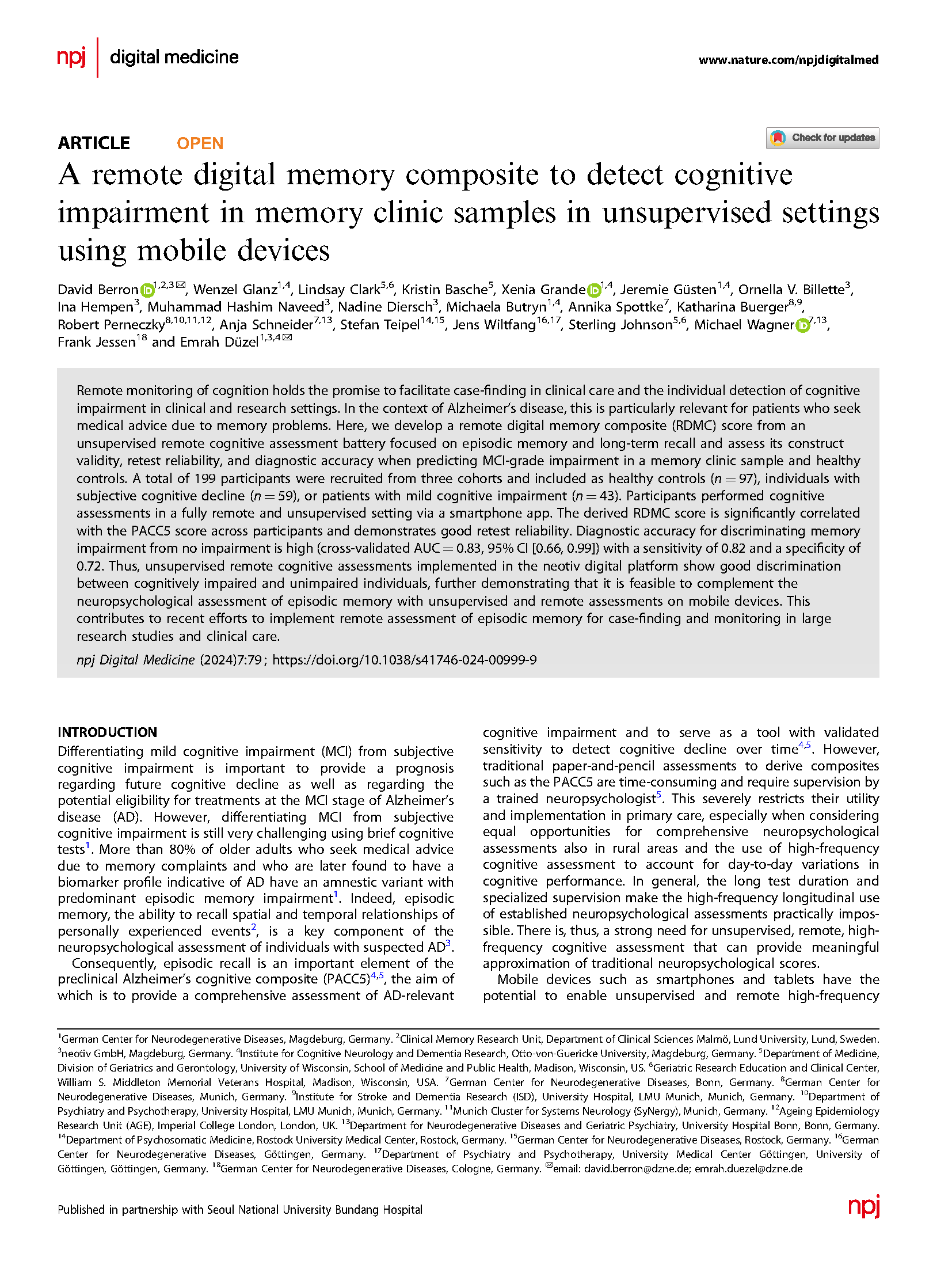
A Remote Digital Memory Composite to Detect Cognitive Impairment in Memory Clinic Samples in Unsupervised Settings using Mobile Devices
Mobile app-based unsupervised monitoring of cognition holds the promise to facilitate case-finding in clinical care and the individual detection of cognitive impairment in clinical and research settings. In this study, a Remote Digital Memory Composite score was developed from test scores of the neotiv digital cognitive assessment battery, and its construct validity, retest reliability and diagnostic accuracy was assessed when predicting MCI-grade impairment in a memory clinic sample and healthy controls. 199 study participants were recruited from three cohorts (the DZNE-Longitudinal Cognitive Impairment and Dementia Study (DELCODE) cohort, the Wisconsin Registry for Alzheimer’s Prevention (WRAP) cohort, and a memory clinic sample) and included as healthy controls (HC; n=97), individuals with subjective cognitive decline (SCD; n= 59) or patients with mild cognitive impairment (MCI; n=43). The derived Remote Digital Memory Composite score was highly correlated with the Preclinical Alzheimer’s Cognitive Composite (PACC5) across participants and demonstrated good retest reliability. Diagnostic accuracy for discriminating memory impairment from no impairment was high (cross-validated AUC = 0.87, 95% CI [0.7, 0.99]) with a sensitivity of 0.85 and a specificity of 0.74 using a testing schedule in which each neotiv test was completed three times. This demonstrates the feasibility of complementing neuropsychological assessments of episodic memory with unsupervised and remote assessments on mobile devices for case-finding and monitoring in large research trials and clinical care.
Authors: Berron D, Glanz W, Clark L, et al.
Journal: npj Digital Medicine (original research paper, peer-reviewed)
Year: 2024
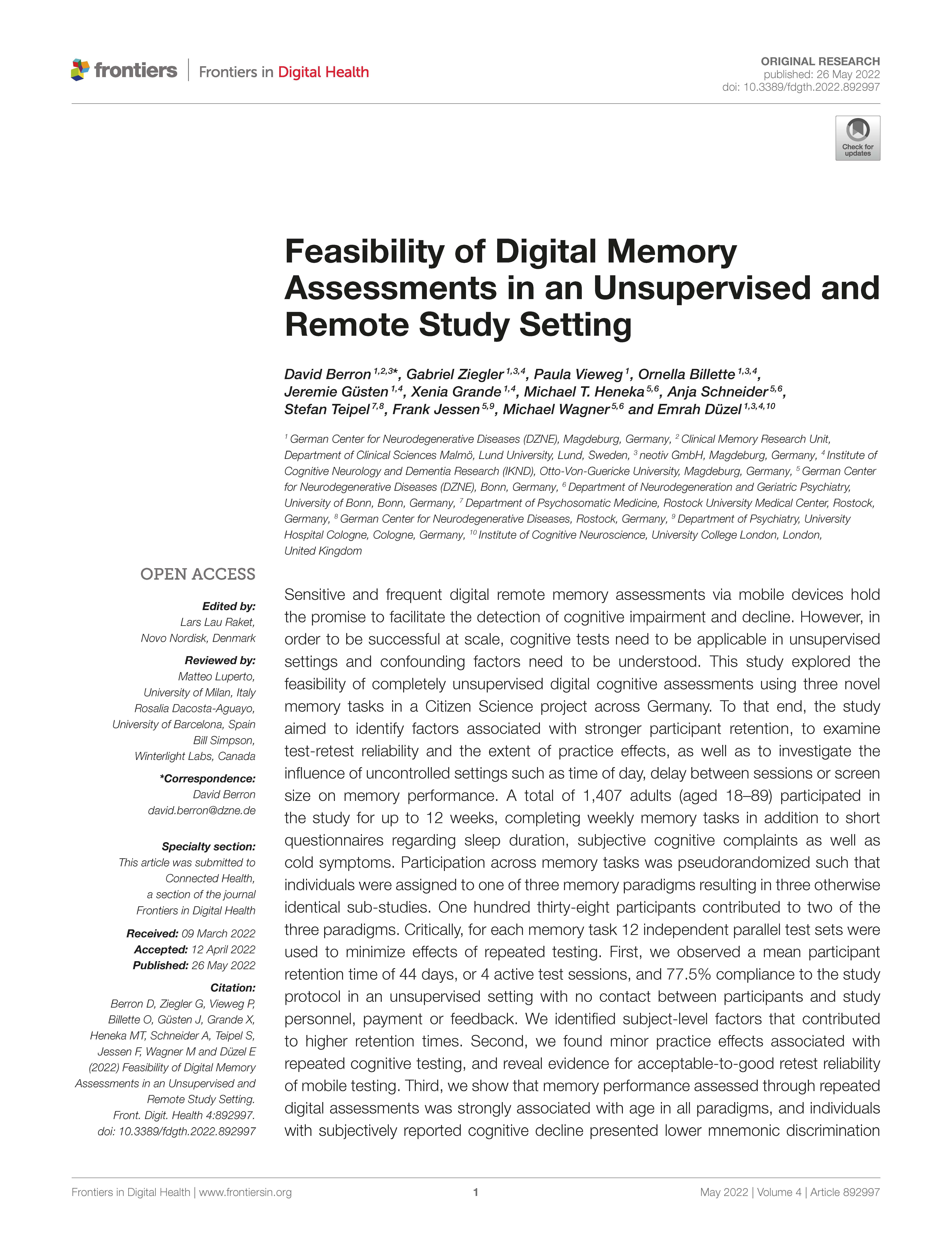
Feasibility of Digital Memory Assessments in an Unsupervised and Remote Study Setting
Sensitive and frequent digital remote memory assessments via mobile devices hold the promise to facilitate the detection of cognitive impairment and decline. This study, based on a Germany-wide Citizen Science project with 1407 participants (aged 18-89), investigated the feasibility of the three tasks of the neotiv digital cognitive assessment battery, completed on a weekly basis for 12 weeks in an unsupervised setting. For each memory task, 12 independent parallel test sets were used to minimize the effects of repeated testing. A mean participant retention time of 44 days was observed and a 77.5% compliance to the study protocol with no contact between participants and study personnel, payment or feedback. In addition, only minor practice effects associated with repeated cognitive testing were found, and reveal evidence for acceptable-to-good retest reliability of the mobile assessments. The study further shows that memory performance was strongly associated with age in all paradigms, and individuals with subjectively reported cognitive decline presented lower mnemonic discrimination accuracy compared to non-complaining participants. Hence, the study demonstrates the feasibility of fully unsupervised digital remote memory assessments.
Authors: Berron D, Ziegler G, Vieweg P, Billette O, et al.
Journal: Frontiers in Digital Health (original research paper, peer-reviewed)
Year: 2022
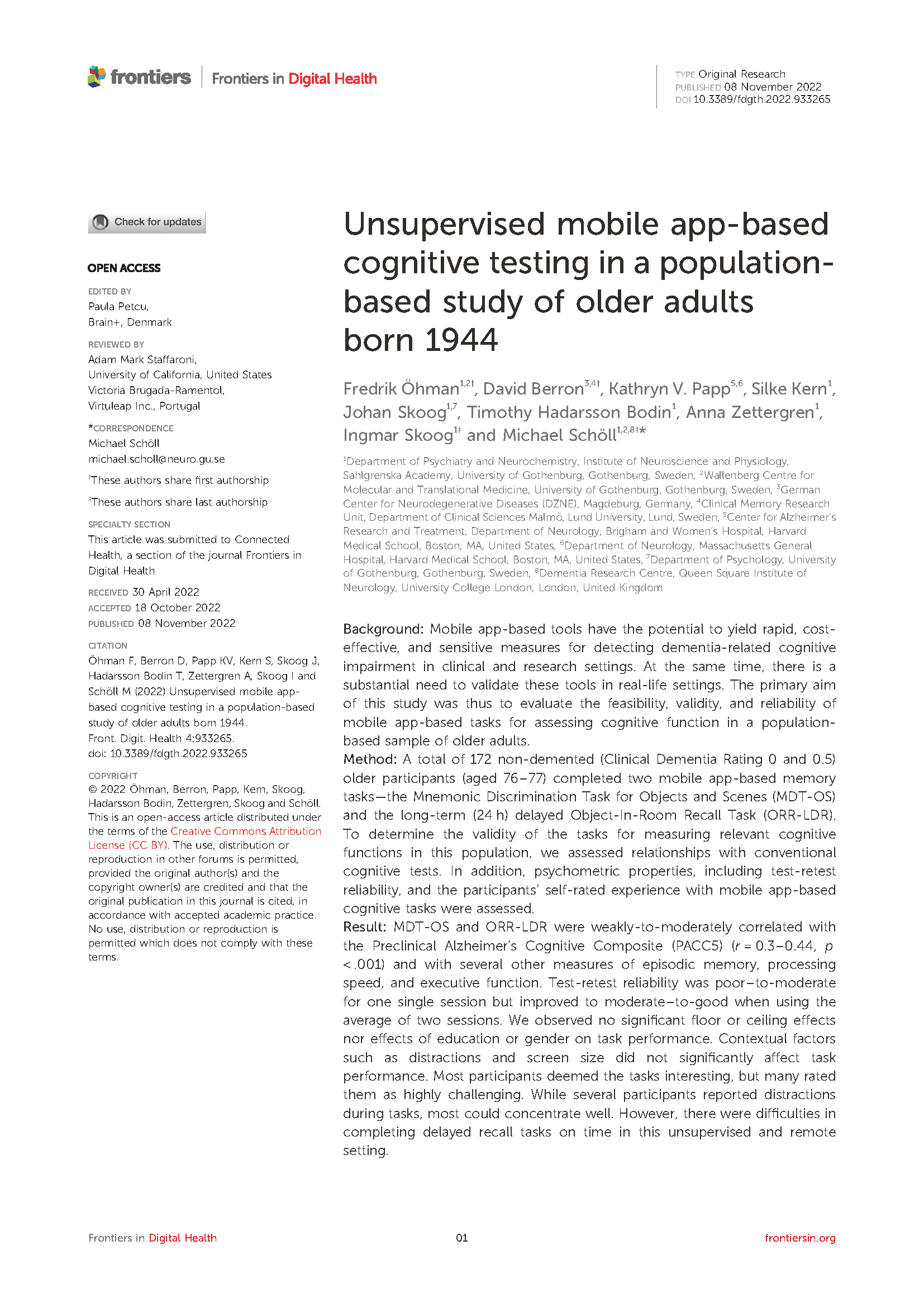
Unsupervised mobile app-based cognitive testing in a population-based study of older adults born 1944
This study evaluated the feasibility, validity, and reliability of tests from the neotiv digital cognitive assessment battery for assessing cognitive function in a population-based sample of 172 non-demented participants, aged 76–77, in Sweden. The two neotiv memory tasks (the Mnemonic Discrimination Task for Objects and Scenes and the Object-In-Room Recall Task in a long-term delayed version) demonstrated weakly-to-moderately correlations with the Preclinical Alzheimer's Cognitive Composite (PACC5). No significant floor or ceiling effects nor effects of education or gender on task performance were observed. Test-retest reliability was improved when using the average of two sessions. The study proves the feasibility of our mobile app-based cognitive assessments in a community sample of older adults, demonstrating its validity in relation to conventional cognitive measures and its reliability for repeated measurements over time.
Authors: Öhman F, Berron D, Papp KV, Kern S, et al.
Journal: Frontiers in Digital Health (original research paper, peer-reviewed)
Year: 2022
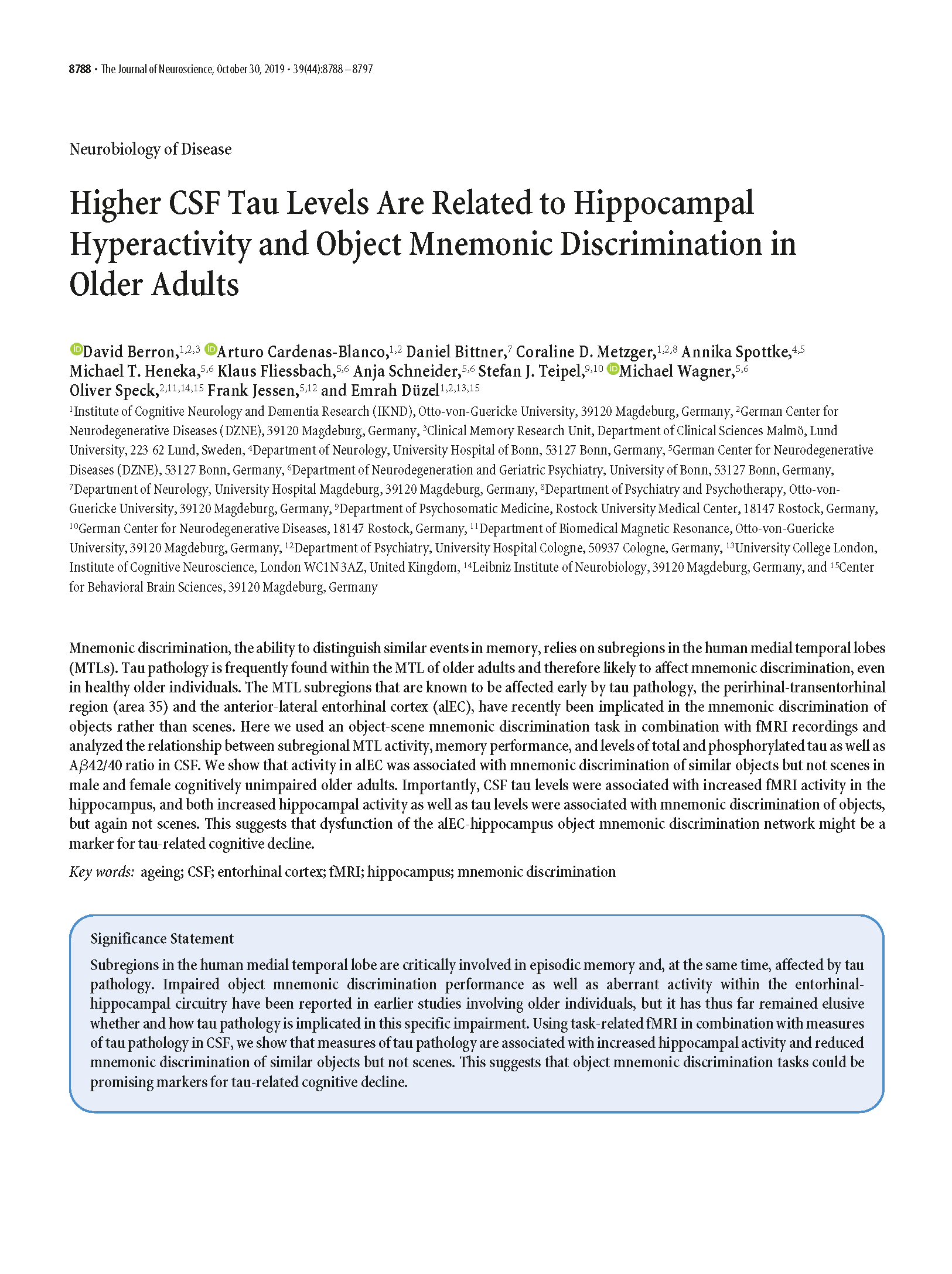
Higher CSF Tau Levels Are Related to Hippocampal Hyperactivity and Object Mnemonic Discrimination in Older Adults
Subregions in the human medial temporal lobe are critically involved in episodic memory and, at the same time, affected by tau pathology. Impaired object mnemonic discrimination performance as well as aberrant activity within the entorhinal-hippocampal circuitry have been reported in earlier studies involving older individuals, but it has thus far remained elusive whether and how tau pathology is implicated in this specific impairment. Using a task that is also part of the neotiv digital cognitive assessment battery (the Mnemonic Discrimination Task for Objects and Scenes) and fMRI in combination with measures of tau pathology in CSF in a sample of cognitively unimpaired older adults, this study shows that measures of tau pathology are associated with increased hippocampal activity and reduced mnemonic discrimination of similar objects but not scenes. This suggests that object mnemonic discrimination tasks could be promising markers for tau-related cognitive decline and underlines the significant relationship between the Mnemonic Discrimination Task for Objects and Scenes and AD biomarkers such as CSF p-Tau.
Authors: Berron D, Cardenas-Blanco A, Bittner D, Metzger CD, et al.
Journal: The Journal of Neuroscience (original research paper, peer-reviewed)
Year: 2019
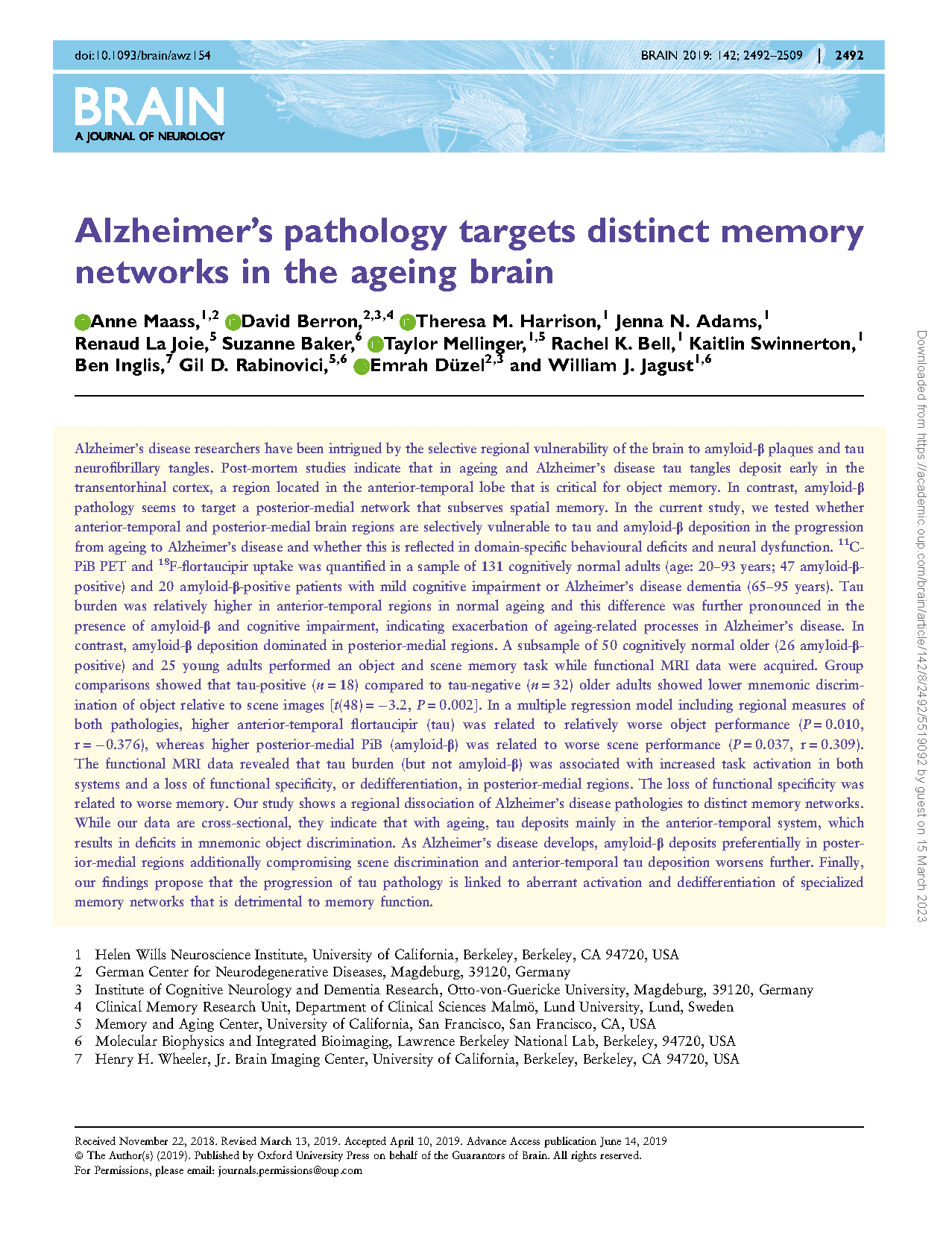
Alzheimer's pathology targets distinct memory networks in the ageing brain
Alzheimer’s disease researchers have always been intrigued by the selective regional vulnerability of the brain to amyloid-β plaques and tau neurofibrillary tangles. This fMRI study tested whether anterior-temporal and posterior-medial brain regions are selectively vulnerable to tau and amyloid-β deposition during the progression from ageing to Alzheimer’s disease and whether this is reflected in domain-specific behavioral deficits and neural dysfunction. Memory functioning was assessed by using the Mnemonic Discrimination Task for Objects and Scenes, which is also part of the neotiv digital cognitive assessment battery, and a regional dissociation of Alzheimer’s disease pathologies to distinct memory networks was found. These results indicate that with ageing, tau deposits mainly in the anterior-temporal system, which results in deficits in mnemonic object discrimination. As Alzheimer’s disease develops, amyloid-β deposits preferentially in posterior-medial regions additionally compromising scene discrimination and anterior-temporal tau deposition worsens further. Finally, the progression of tau pathology seems to be linked to aberrant activation and dedifferentiation of specialized memory networks that is detrimental to memory function.
Authors: Maass A, Berron D, Harrison TM, Adams JN, et al.
Journal: Brain (original research paper, peer-reviewed)
Year: 2019
Further information on scientific foundations
* German Center for Neurodegenerative Diseases (DZNE); Institute for Cognitive Neurology and Dementia Research (IKND) of the Otto von Guericke University Magdeburg
** PACC5: Preclinical Alzheimer's Cognitive Composite-5, a composite score of 5 neuropsychological tests (for the assessment of episodic memory, executive functions and global cognitive performance). An established test battery with high sensitivity for early risk assessment of memory disorders typical of Alzheimer's disease.
1. Berron et al., medRxiv 2023. doi: https://doi.org/10.1101/2021.11.12.21266226.
2. Maass et al., Brain 2019; 142(8): 2492–2509. https://doi.org/10.1093/brain/awz154.
3. Berron et al., Front Digit Health. 2022; 4: 892997. https://doi.org/10.3389/fdgth.2022.892997.

